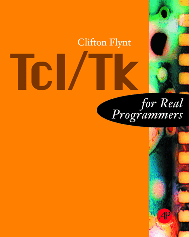
 |
Tcl/Tk For Real Programmers |
![]()
 Tcl/Tk For Real Programmers is the second book in Academic
Press's Real Programmer series. This series is the flip side to
the For Dummies books.
Tcl/Tk For Real Programmers is the second book in Academic
Press's Real Programmer series. This series is the flip side to
the For Dummies books.
The premise for this series of books is that the reader knows how to program, and needs to get up to speed on a new technology as quickly as possible.
These books don't describe flowcharting, or what an if statement does, or what the difference is between disk memory and ram memory. You already know those things, and you don't need to waste time skimming those chapters.
Tcl/Tk for Real Programmers describes enough commands to get you started, and uses those commands to discuss techniques for using Tcl/Tk commands to get jobs done. The book covers topics like using an associative array for complex data, using the package and namespace commands to control large projects, creating new graphic widgets, writing extensions, using the HTML widget, and more.
The CD-ROM accompanying Tcl/Tk For Real Programmers includes several tutorials from the net to help you get up to speed quickly, the Tcl/Tk source distributions, Tcl/Tk binaries for windows and Macintosh, source code and some binaries for Tcl/Tk development tools, and several chapters describing Real World Tcl/Tk projects.
Many Border's Bookstores and a few Barnes & Noble's Bookstores keep
Tcl/Tk for Real Programmers in stock. If your local book dealer
doesn't stock Tcl/Tk for Real Programmer, feel free to tell them
that they should stock my book. :-)
 Table of Contents
Table of Contents
A quick overview of what Tcl/Tk offers the developer.
The low level functions of how to run the interpreter,
what the prompts are, etc.
Describes the Tcl syntax, substitutions, variables, a subset of
the core commands, etc.
Introduces several more commands with a simple POP client
example and a series of examples of searching for data.
Describes techniques for using the Tcl list commands
and how the associative arrays can be used to represent
complex data. A tree data structure is
created as an example.
Describes the Tcl procedure (subroutine) command, and
the methods for defining default values for arguments,
and optional arguments. Explains how Tcl procedures can be
used for object-oriented style programming.
The tree data structure
is converted into a tree object.
How the namespace and package
commands can be used to manage large projects. The tree
object is converted into a package using namespaces. This chapter
includes a step-by-step cookbook for creating a package.
Quick overview of the widgets, and how to use wish.
Canvas Widget, Images and Events
The canvas widget provides a drawing space. Many of its
features are described here. A new GUI widget is created as an
example.
text Widget and html_library
The text widget is an editable text display widget
that supports multiple fonts, colors, etc. The html
display widget is a good example of what can be done with the text
widget features.
Describes both the old style C API, and the 8.0 Tcl_Obj C API. Describes
both functional and structural views of an extension.
A brief discussion of several popular extensions including [incr Tcl],
tclX, Sybtcl, Oratcl, and expect.
Descriptions of several debuggers, lint-style code checkers, reformatters,
packageing tools, etc.
A set of tricks to make your code more maintainable, help you
debug, avoid common errors, etc.
 CD-ROM CONTENTS
CD-ROM CONTENTS
[incr Tcl] Version 3.01 (for Tcl 8.0) for MS-Windows, Macintosh, and Unix systems
[incr Tcl] Version 2.2 (for Tcl 7.6) for MS-Windows, Macintosh, and Unix systems
Tcl/Tk (called tickleTK) is a very powerful programming
language for all sorts of projects, from visual application development to web scripting to
meshing together varieties of applications and utilities written in different languages in
order to create a new application. The program competes very favorably with Visual Basic,
Java, Perl, and UNIX shell languages. It is a great tool for rapid prototype development;
runs on almost all hardware, with no code changes; and is much easier to learn than Perl,
C/C++, or Java. Flynt's book is aimed at programmers, but it is an excellent introduction to
learning the basics of Tcl/Tk. Recommended for large public libraries and most academic
institutions.
 The Library Journal Review (4/1/99)
The Library Journal Review (4/1/99)
Tcl/Tk For Real Programmers should be available from your local
Border's, Little Professor's, Waldenbooks, B-Daltons, Doubleday, etc.
If they don't have the book in stock, they should be able to order it
via their normal distribution channels.
 Purchasing Tcl/Tk For Real Programmers
Purchasing Tcl/Tk For Real Programmers
![]()